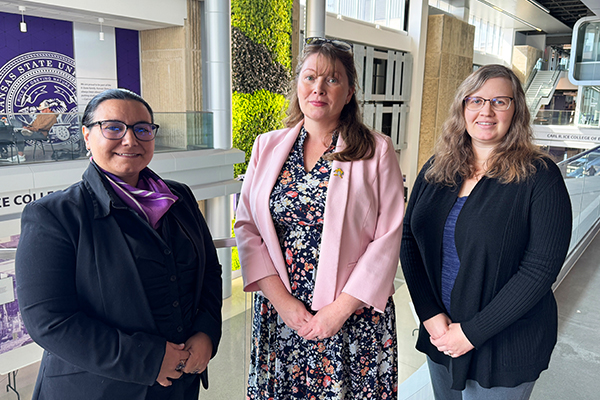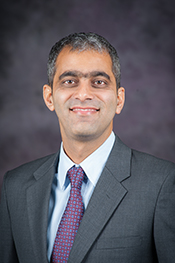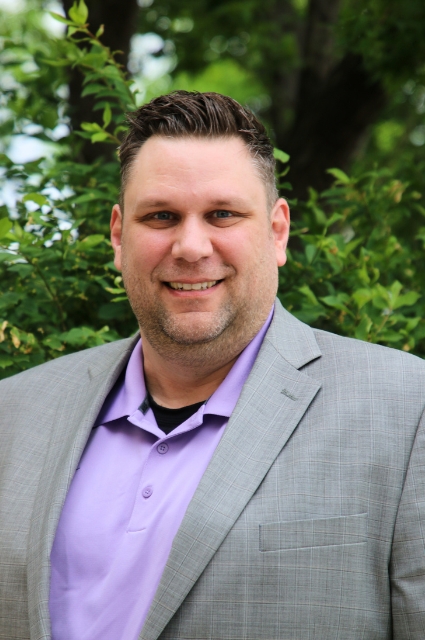
Applying Innovation in Technology to Enhance our Lives
Kansas State University is championing the ethical exploration and integration of technology to advance modern human life.
Harnessing and Mastering the Future of Technology
At Kansas State University, we are actively advancing and applying technology to solve real-world challenges. It's bigger than just the flash and the novelty of technological innovation; it's about the practical application that improves human life and advances our collective society. Whether we are bringing the power of digital agriculture and precision agriculture to local farmers and producers, or we are using advanced AI systems and virtual reality experiences to revolutionize learning and enhance career preparation, K-State is leveraging its teaching, research and outreach mission to make a difference.
Improving Daily Life by Leveraging AI in Space
Frost and ice formation negatively impact industries like aviation, consumer devices, agriculture, and refrigeration and air-conditioning systems year-round. More than $1 billion is spent globally on de-icing planes, and frost can reduce the efficiency of air source heat pumps by up to 60 percent.
Leveraging AI, K-State researchers are studying the slow growth of ice crystals within the International Space Station's microgravity environment. Using machine learning to analyze data from space and here on Earth, researchers will develop predictive models for the formation of frost and ice.
 Amy Betz, assistant dean for retention, diversity and inclusion and associate professor of mechanical and nuclear engineering in the Carl R. Ice College of Engineering, received a nearly $400,000 grant from the National Science Foundation in collaboration with the ISS National Laboratory to develop new models for predicting ice and frost formation. Betz will lead the four-year project alongside co-principal investigators Melanie Derby, Dr. Charles E. Wilson chair in engineering and professor in the Alan Levin Department of Mechanical and Nuclear Engineering, and Hande McGinty, assistant professor of computer science.
Amy Betz, assistant dean for retention, diversity and inclusion and associate professor of mechanical and nuclear engineering in the Carl R. Ice College of Engineering, received a nearly $400,000 grant from the National Science Foundation in collaboration with the ISS National Laboratory to develop new models for predicting ice and frost formation. Betz will lead the four-year project alongside co-principal investigators Melanie Derby, Dr. Charles E. Wilson chair in engineering and professor in the Alan Levin Department of Mechanical and Nuclear Engineering, and Hande McGinty, assistant professor of computer science.
 Ajay Sharda is a professor of biological and agricultural engineering at Kansas State University. Sharda's research focuses on the development, analysis and experimental validation of control systems for agricultural machinery systems with a variety of emphases, including automation, sensor testing/development, mechatronic systems, computer vision, artificial intelligence, developing automated test setups for hardware-in-the-loop simulations, unmanned vehicles and thermal infrared imaging.
Ajay Sharda is a professor of biological and agricultural engineering at Kansas State University. Sharda's research focuses on the development, analysis and experimental validation of control systems for agricultural machinery systems with a variety of emphases, including automation, sensor testing/development, mechatronic systems, computer vision, artificial intelligence, developing automated test setups for hardware-in-the-loop simulations, unmanned vehicles and thermal infrared imaging.When asked about the partnership with Clay Center farmer Brian Martin, Sharda said, "This partnership has been just amazing, considering that we do not have our own farmland at this scale, and these projects — which are basically with real-world, state-of-the-art technologies — are happening on field scale in active collaboration with the growers and in active discussion with the global growers."
Related Academic Programs and Opportunities
 Michael Oetken serves as an assistant professor and graduate faculty in the Department of Integrated Studies at K-State Salina, as well as the Director of K-AIRES. Oetken's areas of expertise include extended reality systems design, user experience design, cyber human systems and strategic media.
Michael Oetken serves as an assistant professor and graduate faculty in the Department of Integrated Studies at K-State Salina, as well as the Director of K-AIRES. Oetken's areas of expertise include extended reality systems design, user experience design, cyber human systems and strategic media.When asked about the real-world application of extended reality in the classroom, Oetken offered, “We created an application that lets our flight students observe what the airspace looks like at the Atlanta airport — one of the busiest in the country. They can move around the airspace, touch an airplane to see the flight number and type of aircraft, watch planes landing and taking off, and basically just learn more than they would watching a video or reading a piece of paper.”
Related Academic Programs and Opportunities
K-State's Technology Development Institute
The Technology Development Institute at Kansas State University provides a broad range of services and project management resources to both private industry and university researchers to advance the commercial readiness of new products and technologies. Learn more about how K-State's Technology Development Institute recently partnered with GO Topeka and Arch Pet Food through the Topeka Plug and Play program to develop a new hypoallergenic pet food formula.